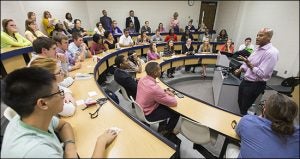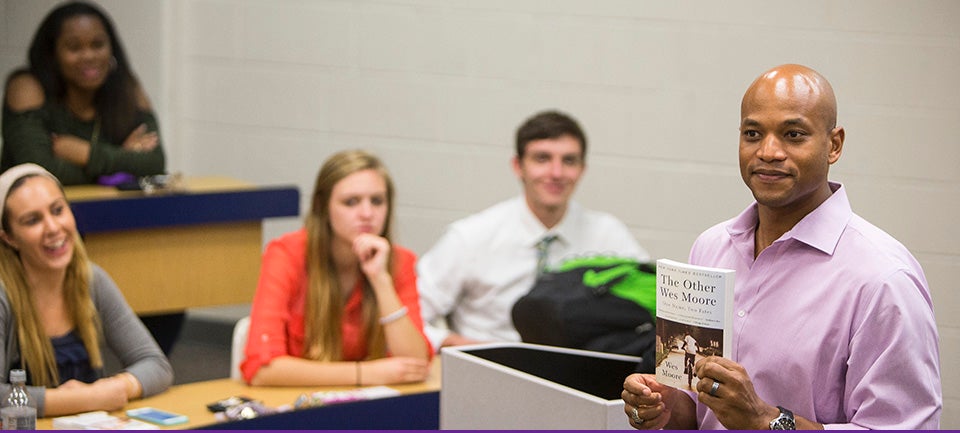BEYOND TRANSCRIPTS
Pirate Read author encourages students to make the most of college
A hush swept over the standing-room-only crowd Oct. 21 in Wright Auditorium as Wes Moore bounded to the center of the stage. The author of “The Other Wes Moore” delivered a message that touched on the importance of accountability, opportunity and community.
“You’re here to be heard,” Moore told the group of mostly students. “You’re here to give it everything you’ve got.”
He urged them to take advantage of higher education and all it has to offer, to experience it not just for good grades but also to exact a positive difference for themselves and for others in college and beyond. “Take this experience and drive it ‘til the wheels fall off,” he said. “Higher education will never simply be determined by your transcripts.”
Moore visited ECU as part of the annual Pirate Read program, through which incoming freshmen are expected to read and study a selected book before arriving on campus. Students then participate in class discussions, seminars and other activities based on the book’s central themes.

ECU students gathered for an in-depth discussion of the Pirate Read selection, led by the book’s author, Wes Moore.
“The Other Wes Moore” explores how the paths of two “Baltimore sons,” both named Wes Moore, diverged based on decisions and circumstances.
The author and the man who shares his name were born blocks apart within a year of each other. The author became a Rhodes Scholar, decorated combat veteran, White House Fellow and business leader.
The other Wes Moore is serving a life sentence for his involvement in the 2000 murder of a Baltimore County police officer.
Moore emphasized the importance of choosing a positive direction in life based on motivation to improve society, and how accountability can change both individuals and society. The book also shows how factors like socio-economic status and the presence of role models can play a part in how people perceive their strengths and abilities— and what they choose to do with them.
“There are people standing on the edge of greatness,” he said, “and they don’t even know it.”
After considering both Moores’ life stories and whether or not to write the book, the author decided to write a letter to the imprisoned Moore. The response he received was “one of the most interesting letters I’ve ever read in my life,” he said. It was also one that raised more questions than answers on how two lives could go in such different directions. The letters continued, followed by face-to-face visits at the prison.
Moore stressed that the point of the book is not to “celebrate one” Wes Moore and “castigate the other,” but that one thing he hopes readers get out of the work is “how thin that line is between our life and someone else’s,” he said.
Earlier in the day, Moore met with a small group of selected students for an in-depth discussion of the book and a question-and-answer session. The students peppered Moore with creative inquiries about the title of the book and how the incarcerated Moore felt about its publication.
The author Moore said he would not have moved forward with the project without the other Moore’s permission—he agreed and gave the author contact information for friends and family whose accounts also appear in the book. Even with his cooperation, said the author, tensions naturally flared at times throughout the research process because of the investigative nature of the project.
“We had to delve into a place of discomfort,” he said. “It was definitely a delicate dance.”
He said the imprisoned Wes Moore was amazed after reading the book, seeing how his decisions and actions changed the course of his life. The author added that he is haunted that the two Wes Moores could have easily been in opposite situations.
“I wanted to let the reader go on a journey,” he said, “to see that it’s the smallest decision—made by us or to us—that can make all the difference in where we end up.”
Evidence of that journey was present in the students’ questions for Moore. Some wondered which Moore was truly the “other Wes Moore,”—both are, Moore said—while others wanted to know the very moment the author knew his own life was headed in a positive direction. One student wanted updates on other people mentioned in the book who played parts in both Moores’ lives—some updates were good; others were tragic.
Destiny DeHart, a senior majoring in art and psychology, was selected to attend the small group session through the Honors College and EC Scholars program. She said hearing Moore speak helped her view the book and its themes in a new narrative voice and perspective.
“I want to go back and re-read it in his voice,” she said. “You could really see how he grew.”
DeHart said that having access to authors and other guest speakers on campus enriches students’ experiences and enables them to learn as much as possible from the speaker’s expertise.
“These kinds of opportunities,” she said, “are really important to the quality and our outlook as a college and as individuals.”
The Pirate Read program encourages students to engage in intellectual dialogue and critical thinking. It offers opportunities for students and faculty to relate the selected books’ central themes across the curriculum. Each year, a committee of faculty, staff and students choose the book. Recent selections include “Picking Cotton,” “The Immortal Life of Henrietta Lacks,” and “It Happened on the Way to War.”
